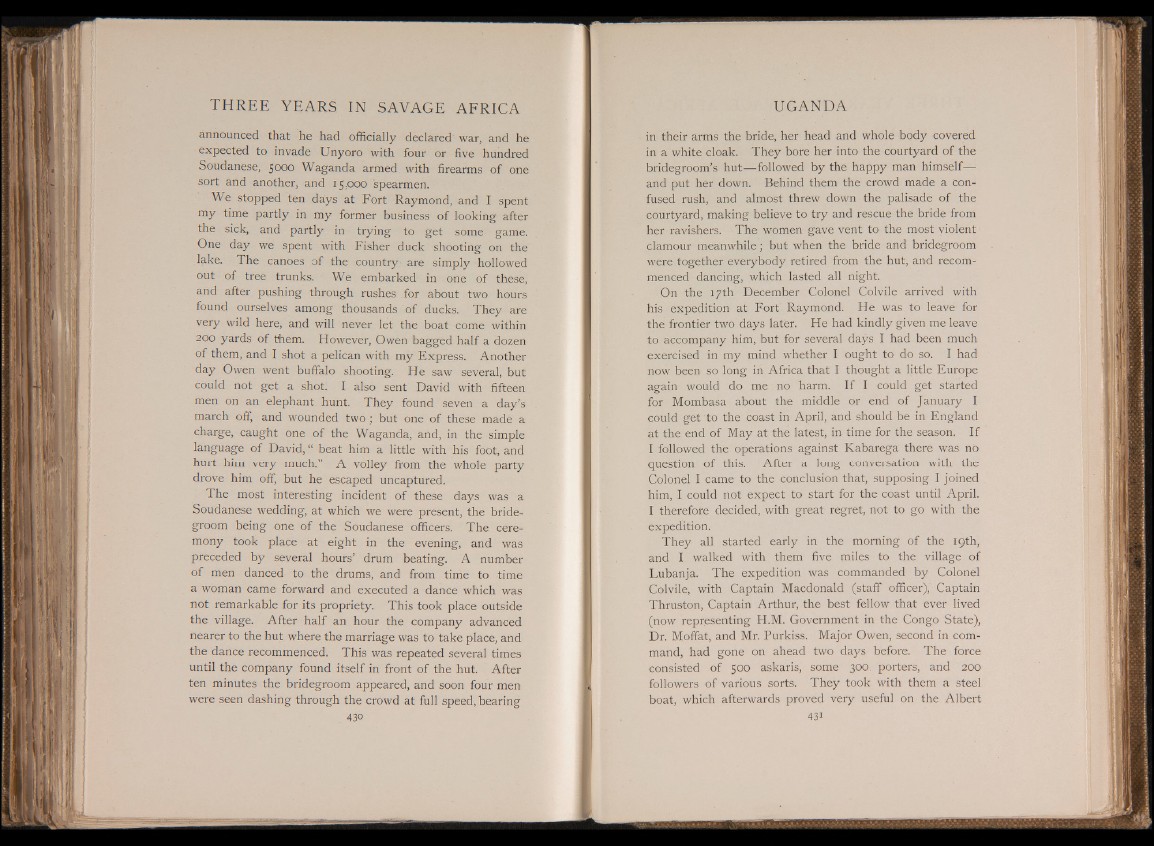
announced that he had officially declared war, and he
expected to invade Unyoro with four or five hundred
Soudanese, 5000 Waganda armed with firearms of one
sort and another, and 15.000 spearmen.
We stopped ten days at Fort Raymond, and I spent
my time partly in my former business of looking after
the sick, and partly in trying to get some game.
One day we spent with Fisher duck shooting on the
lake. The canoes of the country are simply hollowed
out of tree trunks. We embarked in one of these,
and after pushing through rushes for about two hours
found ourselves among thousands of ducks. They are
very wild here, and will never let the boat come within
200 yards of them. However, Owen bagged half a dozen
of them, and I shot a pelican with my Express. Another
day Owen went buffalo shooting. He saw several, but
could not get a shot. I also sent David with fifteen
men on an elephant hunt. They found seven a day’s
march off, and wounded two ; but one of these made a
charge, caught one of the Waganda, and, in the simple
language of David, “ beat him a little with his foot, and
hurt him very much.” A volley from the whole party
drove him off, but he escaped uncaptured.
The most interesting incident of these days was a
Soudanese wedding, at which we were present, the bridegroom
being one of the Soudanese officers. The ceremony
took place at eight in the evening, and was
preceded by several hours’ drum beating. A number
of men danced to the drums, and from time to time
a woman came forward and executed a dance which was
not remarkable for its propriety. This took place outside
the village. After half an hour the company advanced
nearer to the hut where the marriage was to take place, and
the dance recommenced. This was repeated several times
until the company found itself in front of the hut. After
ten minutes the bridegroom appeared, and soon four men
were seen dashing through the crowd at full speed, bearing
43«
in their arms the bride, her head and whole body covered
in a white cloak. They bore her into the courtyard of the
bridegroom’s hut—followed by the happy man himself—
and put her down. Behind them the crowd made a confused
rush, and almost threw down the palisade of the
courtyard, making believe to try and rescue the bride from
her ravishers. The women gave vent to the most violent
clamour meanwhile; but when the bride and bridegroom
were together everybody retired from the hut, and recommenced
dancing, which lasted all night.
On the 17th December Colonel Colvile arrived with
his expedition at Fort Raymond. He was to leave for
the frontier two days later. He had kindly given me leave
to accompany him, but for several days I had been much
exercised in my mind whether I ought to do so. I had
now been so long in Africa that I thought a little Europe
again would do me no harm. If I could get started
for Mombasa about the middle or end of January I
could get to the coast in April, and should be in England
at the end of May at the latest, in. time for the season. If
I followed the operations against Kabarega there was no
question of this. After a long conversation with the
Colonel I came to the conclusion that, supposing I joined
him, I could not expect to start for the coast until April.
I therefore decided, with great regret, not to go with the
expedition.
They all started early in the morning of the 19th,
and I walked with them five miles to the village of
Lubanja. The expedition was commanded by Colonel
Colvile, with Captain Macdonald (staff officer), Captain
Thruston, Captain Arthur, the best fellow that ever lived
(now representing H.M. Government in the Congo State),
Dr. Moffat, and Mr. Purkiss. Major Owen, second in command,
had gone on ahead two days before. The force
consisted of 500 askaris, some 300. porters, and 200
followers of various sorts. They took with them a steel
boat, which afterwards proved very useful on the Albert
43i